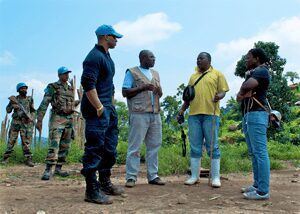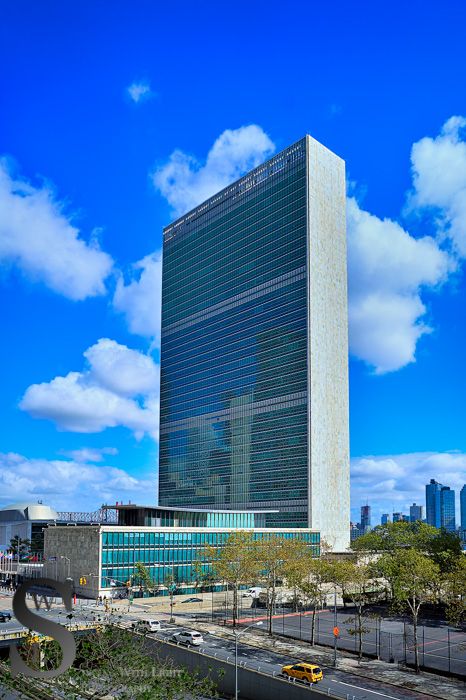Recent Adaptations Of Peacekeeping Practice Are Bringing Into Question The Role Of Civilian Components In UN Peace Operations, Notably The Human Rights Sections.
When António Guterres succeeds Ban Ki-moon as UN Secretary-General, many problems will be waiting for him, including challenges to the fundamental values underpinning UN peacekeeping. Uncooperative host governments and shifting conflict environments, including asymmetrical threats and violent extremism, are testing blue helmets on the ground. Recent adaptations of peacekeeping practice are also bringing into question the role of civilian components in UN peace operations, notably the human rights sections. The growing use of offensive mandates to quash negative forces and ensure protection of civilians has sometimes made the UN a party to the conflict and has cast doubt on the civilian staff’s protection under international humanitarian law. Recommendations by the High-level Independent Panel on Peace Operations (HIPPO) on the primacy of politics also bring into question the principles of impartiality and transparency that lie at the core of credible human rights monitoring. How can UN peace operations ensure robust protection of civilians and broker political solutions while maintaining a transparent and impartial human rights agenda?
At its conception, peacekeeping was formed around three core tenets, often referred to as the ‘principles of peacekeeping’. These included the requirement of consent from the parties, impartiality and non-use of force, except in self-defense. For the most part, they have stood the test of time since Secretary-General Dag Hammarskjöld defined them while devising the UN Emergency Force (UNEF) in Suez in 1956. However, in recent years UN peacekeeping has departed from these principles as operational environments have become less permissive and in key theaters there has been less or little peace to keep. Consent has proven less reliable in conflict areas where governments or non-state armed groups deny access to peacekeepers, like in Sudan, South Sudan or Mali. Impartiality has become questionable for missions specifically deployed to support a host state Government, sometimes against non-state armed groups opposing national authorities. Since exceptions to the non-use of force principle include the defense of the mandate, as outlined by the Capstone Doctrine, and as mandates now prioritize the protection of civilians by all necessary means for most UN missions, peacekeepers are increasingly called upon to use force against potential perpetrators of violence. Current concepts of operations and rules of engagement have made it clear that blue helmets are authorized to use force to protect civilians from imminent threat of physical violence by any party. More generally, the posture of modern peace operations has adapted by the adoption of robust mandates. In some theatres, special military units with offensive directives were authorized, such as the Force Intervention Brigade (FIB) initially deployed in 2013 in eastern DRC to neutralize armed groups, or the soon-to-be-deployed Regional Protection Force in South Sudan, mandated to engage any actor preparing attacks.
Evolution
This evolution naturally poses many questions and challenges for the UN military forces on the ground. But these shifts also are of equal consequence for the civilians working in peace operations. Boutros Boutros-Ghali recognized the central role of civilians in peacekeeping in his Agenda for Peace, and from the 1990s, the UN ushered in the era of multi-dimensional and integrated peacekeeping where civilian, police and military components would work together to implement Security Council mandates. Civilian experts and advisors, specialized in specific areas such as Civil Affairs, Justice or DDR were expected to operate alongside blue helmets in order to provide a more comprehensive response to conflict and post-conflict challenges. As a result of human rights mainstreaming throughout the UN, civilian human rights sections were also formed and bound to the forefront, constituting one of the largest segments of civilian peacekeeping components.
Tasked with sensitizing the parties and communities on the norms of human rights and humanitarian law as well as monitoring and investigating human rights violations, the human rights sections play a key role in supporting the rule of law and documenting abuses in order to help bring perpetrators to justice. Human rights sections support host governments in upholding their human rights obligations and as an accountability measure, human rights reporting keeps pressure on governments to uphold the rule of law.
However, for human rights monitoring to be credible, it is essential that human rights officers operate according to international standards, which include a set of basic principles outlined by the Office of the High Commissioner for Human Rights (OHCHR), including impartiality and transparency. Any perceived siding with one party or another poses very distinct challenges to human rights work and undermines the credibility of reporting. In most UN peace missions, offensive or politically charged mandates as well as non-permissive environments raise fundamental challenges for human rights sections.
Integrated peacekeeping establishes that civilian components will work with military components in support of the mandate and they do so notably by contributing to situational awareness and providing information analysis through the missions highly institutionalized reporting mechanisms. Human rights officers report daily and weekly activities to the mission leadership and log confidential information related to individual cases in an online database. On occasion, senior human rights officers can assume the role of Head of Office and represent the mission at meetings with government officials or with non-state armed groups. Human rights officers coordinate on a daily basis with the UN military component on protection of civilian concerns and to organize their own security when moving about the country. They are closely integrated into all aspects of the mission and it is reasonable to question the supporting role those civilian peacekeepers play in robust military operations.
Uncooperative Host Governments And Shifting Conflict Environments, Including Asymmetrical Threats And Violent Extremism, Are Testing Blue Helmets On The Ground.
The growing perception of the partiality of peace operations has contributed to a certain loss of trust between the human rights section and many of the other important actors on the ground. When peace operations are perceived as neutral and impartial by local actors, the human rights sections enjoy greater access to all parties, including rebel groups and militias who often demonstrate a willingness to respect human rights and stop abuse, However, in parts of the Central African Republic, dialogue with certain armed groups has faltered because MINUSCA is viewed as siding with rival armed groups or the government. The recent criticisms against MINUSCA from the FPRC, an ex-Séléka group accusing UN peacekeepers of supporting the UPC, another ex-Séléka militia, further challenged the work of human rights officers in FPRC-controlled areas. In the DRC, MONUSCO adopted a rather partial approach when it decided to avoid any interaction with M23 and to suspend human rights activities in areas controlled by the armed group. Since the UN Mission received its mandate to “carry out targeted offensive operations” against armed groups, the areas under control of the FDLR and ADF Nalu became troublesome for human rights officers since the mission had a clear mandate to neutralize and disarm those groups. The space for negotiation and discussion was severely reduced for human rights work, and access to communities living in those areas has proven increasingly difficult. Similarly in Mali, human rights officers have very limited access to much of the north of the country due to severe security risks and regular attacks on MINUSMA peacekeepers by extremist groups that consider the UN to be the enemy. In all those environments, human rights officers have lost some of the leverage they used to have for influencing armed groups behavior and pushing for the respect of human rights and humanitarian law.
Humanitarian Space
In addition, relationships with humanitarian actors and UN agencies have also been affected by the robust stance adopted by some peacekeeping operations. Humanitarians are understandably protective of their impartial status and willing to preserve their “humanitarian space” and access. They are consequently less and less keen to be seen as having any affiliation with a UN mission that could be perceived as partial or politically biased. This greatly impacts the work of human rights officers, who often rely on information sharing with humanitarians to document abuse and support their investigations.
Moreover, trust can also be strained inside the UN Mission itself, between human rights officers and blue helmets. UN troops operating under an offensive mandate or engaging in robust military operations are likely to be wary of human rights officers potentially monitoring the conduct of military operations, which can potentially result in a breakdown of internal cooperation and information sharing.
Peacekeeping missions have been marked by a militarization of their modus operandi and an increasing politicization of their stance. Far from the original peacekeeping model, based on the deployment of a small number of military observers keeping an eye on cease-fires, modern peacekeeping has evolved to respond to more complex and demanding conflict and post-conflict situations. They generally act in support of a host state, might be mandated to target ‘negative’ armed elements or spoilers in order to protect civilians, and often have to compromise and adapt to changing international, national or local political dynamics to continue operating. In this context, the civilian components, and more specifically the human rights sections, face difficult contradictions and have to make delicate choices. Human rights officers have to find the right balance to continue to respect the basic principles of human rights monitoring and investigation, while being embedded in a highly political and militarized entity. If the new secretary-general chooses to perpetuate the dynamics launched by the Human Rights up Front initiative and to prioritize human rights, he will have to decide where human rights fits in this new era of peacekeeping. He will notably have to address the challenges of redesigning the structure and role of civilian components in peace operations for a new type of integrated missions
Although solutions will not come easy, one option for the human rights sections could be to consider the feasibility of an independent presence of OHCHR in countries with particularly challenging operations. A stand-alone OHCHR office would allow human rights teams to regain a sense of impartiality because they would operate independently of the mission, but this would jeopardize the integrated approach. The Department of Peacekeeping Operations (DPKO) and OHCHR should also regularly review, discuss and adapt the existing policy on human rights in peace operations in order to take into consideration the new challenges related to the role of human rights officers in robust missions, and to provide detailed guidance for field personnel facing daily contradictions between OHCHR principles and DPKO positions. A thorough analysis of the consequences of robust operations for the civilian components, and of lessons learned in DRC, CAR, South Sudan, Darfur or Mali in this regard, could also contribute to inform upcoming reforms for the Secretariat in order to preserve a viable and balanced integrated approach of multidimensional peacekeeping.
Alexis Guidotti is a CIC Visiting Scholar and PhD candidate at the University of Paris II Panthéon-Assas | Twitter: @AlexisGuidotti



